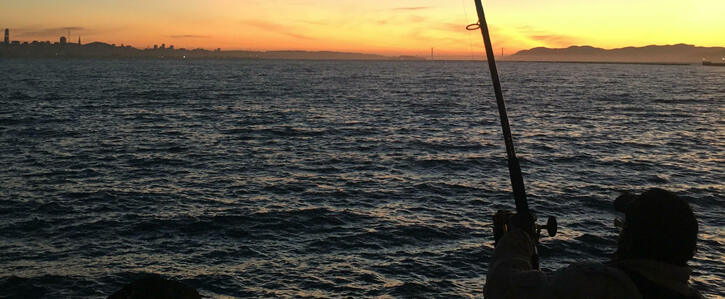The Marina provides:
• A rich natural environment, providing bird, plant, and marine habitat, plus coastline protection
• A favorite regional fishing spot, even without the Berkeley Pier
• Affordable access to watercraft recreation, like sailing, paddle boarding, kayaking, dragon boating and windsurfing
• Locations of cultural significance to Native American tribes
• Environmental education through the Shorebird Park facilities
• Unique children’s education at Adventure Playground
• Berthing for boat owners, fishermen, small-scale ferry service, and liveaboards
• Biking and swimming venue that saw major increase use as a rare outlet during the pandemic
• Existing small-scale ferry service (Tidelines) from inside the Marina
• A regional park with walking trails, off-leash dog walk area, kite flying, picnic areas and festival venues
• Two restaurants, a hotel, a yacht club, a bait shop, a shipyard, and a sailing school
The parallel project approach fast-tracks a large-scale WETA ferry program by separating out a partial-pier-with-ferry project from the Marina area plan. By putting the ferry development ahead of other, perhaps larger, social, cultural, economic and environmental benefits of the Marina, planners are risking a WETA ferry failure as seen in other areas of the Bay where parking has overwhelmed surrounding areas beyond designated parking sites (Jack London Square) or, at the other extreme, ferries are heavily subsidized yet poorly used at the constructed scale, wasting millions of dollars. A slapdash ferry deal could undermine everything that makes the Berkeley Marina an enjoyable place to go and turn it into a parking lot for commuters as cars sit from 8 am until 6 pm each day.
The City’s own Parks and Waterfront Commission (PWC), an advisory council to the City, has raised numerous questions to WETA and the City, many of which go unanswered. A marina users’ group has assembled a document describing the issues in more detail (
https://drive.google.com/file/d/120_OZerFZX2CjSaErqm7-zoDgCQ1ldnp/view?usp=sharing ). But we need help to persuade entrenched opinions among city leaders.
What you can do
Help us move City Council to consider a range of options that put the Marina on a “long-term sustainable path” as recommended by the PWC and supported by marina user groups. These options may include ferry service, but only at a scale that is compatible with the Marina’s core recreational uses, cultural significance and environmental benefits. We ask that the City stop the parallel strategy of Pier/Ferry v. overall Berkeley Marina Area Specific Plan and unite the efforts for a consistent and representative future for broader set of users beyond just ferry commuters. We also request that the City publicly provide the following information:
1. What is the maximum planned daily ridership of the ferry service?
2. What has been the historical ridership of the existing, small-scale ferry service?
3. What parking lots will be used for ferry riders, and how many ferry riders will park in each lot?
4. How will recreational use parking lots be protected against commuter parking?
5. Will a new restaurant for the Hs Lordships (199 Seawall) space be ruled out by the ferry terminal?
6. Will windsurfer, kayaker and swimmer access to the Hs Lordships/199 Seawall cove be ruled out by the ferry terminal?
7. Will shoreline fishing between Hs Lordships and the existing pier be impacted?
8. How much will the WETA project pay towards the replacement of the fishing pier?
9. What will be Berkeley’s financial liability for the ferry?

